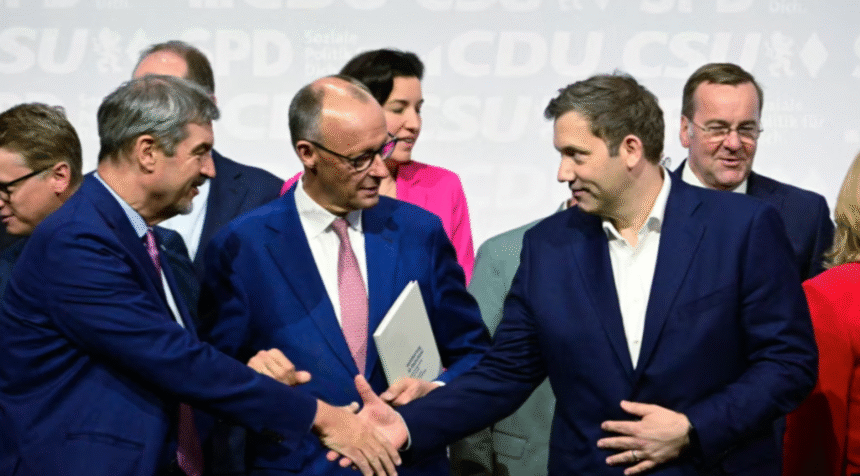Germany’s new ruling coalition, led by the conservatives, begins its work on Tuesday under the leadership of Chancellor Friedrich Merz, about three months after the parliamentary elections held in February.
The coalition — consisting of Merz’s Christian Democrats (CDU), Bavaria’s Christian Social Union (CSU), and the center-left Social Democratic Party (SPD) is set to govern Germany for the next four years.
These three parties drafted a governing program in their coalition agreement in April, promising to revive the struggling economy, tighten immigration rules, and cut public spending.
Critics have argued that the 144-page document lacks concrete commitments, and even the promises it does contain are limited by what has been called a “fiscal constraint.”
However, Merz is expected to enjoy more budgetary flexibility than his predecessor Olaf Scholz, as the parties quickly passed a historic package in Parliament. This included constitutional changes to allow increased defense spending and the approval of a €500 billion fund for infrastructure and climate protection measures.
Reviving the Economy
The top priority for the new government will be to reignite Germany’s economic engine, which has stalled for two consecutive years following Russia’s invasion of Ukraine.
To encourage investment, the coalition will allow companies to deduct 30% of their investments from taxes over the next three years. Additionally, the corporate income tax will gradually decrease starting in 2028.
The coalition also plans to reduce bureaucracy by repealing Germany’s Supply Chain Act — which came into force in 2023 to oversee human rights and environmental risks along the supply chain — in favor of EU-wide directives, thereby avoiding extra paperwork for German companies.
They also aim to tackle high energy costs by introducing a price cap for energy-intensive industries.
Curbing Immigration
Immigration was the most contentious issue during the election campaign, especially after several attacks were blamed on refugees.
The coalition has pledged to maintain border controls and turn back illegal migrants at the border, even if they are seeking asylum. However, such decisions will be made “in coordination with our European neighbors.”
No new voluntary refugee resettlement programs will be introduced. Refugees with limited protection status will not be allowed to bring family members to Germany for an initial period of two years.
The government also plans to reform citizenship rules by eliminating the fast-track path to naturalization after just three years for well-integrated migrants.
However, it will retain the lowered general residency requirement for citizenship (from eight to five years) and continue allowing dual citizenship for residents from non-EU countries.
Defense, Security, and Foreign Policy
The Merz administration faces a changing world, particularly as Europe braces for a potential return of Donald Trump to the White House.
The coalition agreement reaffirms the parties’ commitment to the European Union, NATO, and the transatlantic economic partnership with the U.S., despite Trump’s aggressive trade policies.
In terms of defense, the new administration plans to introduce a voluntary military service program modeled after Sweden’s, nearly 15 years after Germany suspended conscription.
A National Security Council will also be established to centralize data and enable faster decision-making in response to national and international crises.
The coalition plans to save money by significantly cutting the federal budget.
Budget and Social Spending
In the civil administration, 8% of jobs will be eliminated over four years excluding security forces. The number of federal commissioners (independent experts who advise the government) will be halved. A total of €1 billion will be saved from development programs and contributions to international organizations.
The previous reform of unemployment benefits known as “citizen’s income” will be renamed “basic security for jobseekers” and will be tightened.
In extreme cases, all benefits may be withdrawn if a person repeatedly refuses reasonable job offers.
The coalition also intends to reform the current 8-hour workday regulation by replacing it with a weekly working time framework.
In a win for the Social Democrats, the agreement includes a commitment to raise the minimum wage to €15 per hour.
Taxes and Subsidies
During the campaign, the parties had sharp disagreements over tax policy — the CDU/CSU bloc promised tax cuts, while the SPD advocated raising taxes for high earners.
The final agreement is a compromise: tax cuts within two years for low- and middle-income earners.
The controversial 5.5% “solidarity surcharge,” used to cover the costs of German reunification, will remain in place for individuals and companies with high incomes. Travel subsidies will be expanded.
In transport, the “Deutschlandticket” — offering unlimited access to regional public transport for €58 per month — will continue beyond 2025, though users should expect price increases after 2029.
Other Promises: Cash, Cannabis, and COVID-19
The document also includes pledges in a variety of other areas, from cash payments to cannabis and pandemic policies.
Many visitors to Germany are surprised by the widespread use of cash in small shops.
According to the agreement, the coalition aims to ensure at least one digital payment option is available for consumers.
Meanwhile, the partial legalization of cannabis for adults introduced by the previous government will be reviewed. A formal commission will be established to investigate the strict measures taken during the COVID-19 pandemic.







